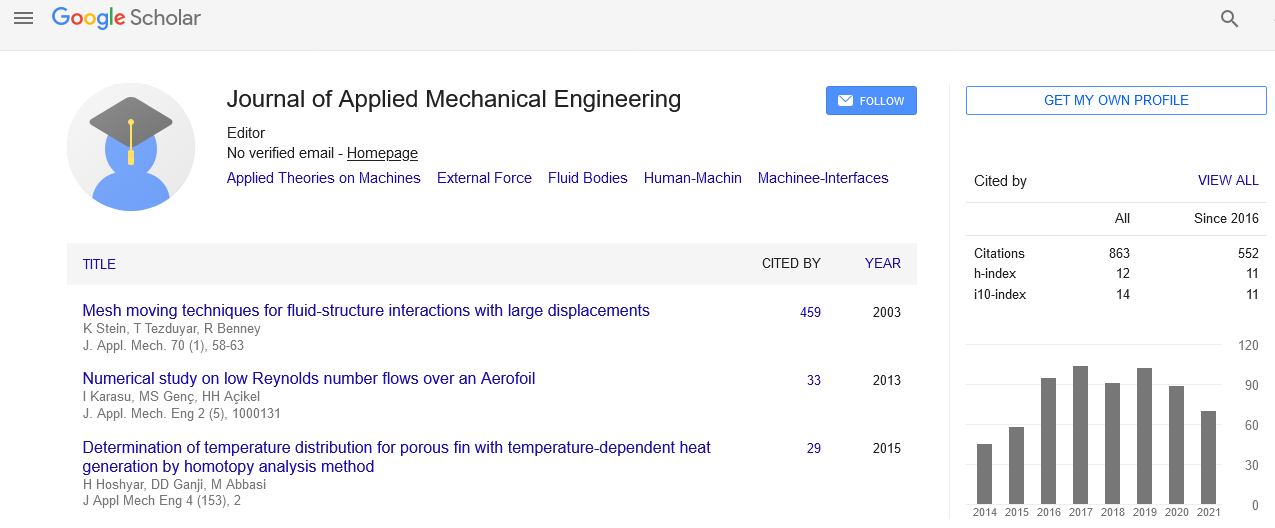Indexed In
- Genamics JournalSeek
- JournalTOCs
- CiteFactor
- RefSeek
- Hamdard University
- EBSCO A-Z
- OCLC- WorldCat
- Publons
- Google Scholar
Useful Links
Share This Page
Journal Flyer

Open Access Journals
- Agri and Aquaculture
- Biochemistry
- Bioinformatics & Systems Biology
- Business & Management
- Chemistry
- Clinical Sciences
- Engineering
- Food & Nutrition
- General Science
- Genetics & Molecular Biology
- Immunology & Microbiology
- Medical Sciences
- Neuroscience & Psychology
- Nursing & Health Care
- Pharmaceutical Sciences
The role of infinite dimensional direct adaptive control in quantum information systems
4th International Conference and Exhibition on Mechanical & Aerospace Engineering
October 03-04, 2016 Orlando, USA
Mark J Balas
Embry-Riddle Aeronautical University, USA
Keynote: J Appl Mech Eng
Abstract:
Many control systems are inherently infinite dimensional when they are described by partial differential equations. Currently there is renewed interest in the control of these kinds of systems especially in flexible aerospace structures and the quantum information field. Since the dynamics of these systems will not be perfectly known, it is especially of interest to control these systems adaptively via low-order finite-dimensional controllers. When systems are subjected to unknown internal delays, they are also fundamentally infinite-dimensional in nature. In our work, we have developed direct model reference adaptive control and disturbance rejection with very low-order adaptive gain laws for as infinite â??dimensional systems on Hilbert spaces. Quantum Information Systems are fundamentally infinite dimensional. And the basic operations that can be performed on quantum systems to manipulate information are unitary quantum gates. Because of the nature of entanglement at the quantum level these gates suffer from de-coherence and cannot operate in a fully unitary way. It is also quite difficult to perform experiments that would identify all the parametric data needed to create precise models of a particular quantum system. Instead direct adaptive control that is suited to infinite dimensional systems could provide a reduction in the decoherence and allow the quantum gates to function in a more idealized unitary way. This talk will focus on the effect of infinite dimensionality on the adaptive control approach and the conditions required for asymptotic stability with adaptive control. Then I would like to go on and consider some of the issues in the control of quantum information systems. The topics here may sound highly technical, maybe even forbidding, and to some extent they are. But I hope to give you a version of them that will be reasonably accessible and will still remain as exciting and attractive to you as they are to me.
Biography :
Mark J Balas is a distinguished faculty member in Aerospace Engineering at Embry-Riddle Aeronautical University. He was formerly the Guthrie Nicholson Professor of Electrical Engineering and former Head of the Electrical and Computer Engineering Department at the University of Wyoming. He has the following technical degrees: PhD in Mathematics, MS Electrical Engineering, MA Mathematics and BS Electrical Engineering. He has held various positions in industry, academia and government. Among his careers, he has been a university Professor for over 30 years with RPI, MIT, University of Colorado-Boulder and University of Wyoming and has mentored 42 Doctoral students. He has over 350 publications in archive journals, refereed conference proceedings and technical book chapters. He has been visiting faculty with the Institute for Quantum Information and the Control and Dynamics Division at the California Institute of Technology, the US Air Force Research Laboratory-Kirtland AFB, the NASA-Jet Propulsion Laboratory, the NASA Ames Research Center and was the Associate Director of the University of Wyoming Wind Energy Research Center and adjunct faculty with the School of Energy Resources. He is a life fellow of the AIAA, a life fellow of the IEEE, and a fellow of ASME.
Email: balasm@erau.edu

